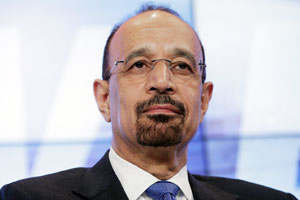OPEC Said to Work on Oil Deal to Restore Unity

Conversations June 1 included the potential for restoring a production target that OPEC scrapped in December after an acrimonious meeting, according to delegates familiar with the talks. The return of an output ceiling is one of several options under discussion, the same people said, asking not to be identified because the talks aren’t public.
Although the Organization of Petroleum Exporting Countries regularly ignores its own output targets, delegates said that even token gestures could show a renewed unity and lift prices. The discussions included a new ceiling of 32 million barrels a day, said Amrita Sen, chief oil analyst at consultant Energy Aspects Ltd. That would compare with 33.2 million pumped in April, according to data compiled by Bloomberg News.
"Contrary to market speculation, Saudi Arabia is open to cooperation," Sen said in a report. "Views that it will flood the market" have been acting as a cap on prices, she said.
Any deal will depend on Iran, which until now has rejected any cap on its production. Saudi Arabia and its allies, including the United Arab Emirates, have said in the past that Iran needs to participate in any production deal.
Saudi Arabia, the world’s largest oil exporter, is planning to use the OPEC meeting on June 2 to repair relationships with fellow producers after the failure of an April accord in Doha to freeze crude output, according to people familiar the matter. Khalid Al-Falih, who took over as Saudi oil minister last month, met June 1 with counterparts from the Gulf, Nigeria and Venezuela.
While Riyadh has changed its tone, there’s no indication yet that Saudi Arabia is seeking to alter current production volumes, the people said. The diplomatic overture was described as a gesture rather than an actual shift in policy.
“It seems reasonable that the new Saudi energy minister, Khalid Al-Falih, may wish to start with a cleaner slate and improve the tonal dynamics inside OPEC,” said Bob McNally, head of consultant The Rapidan Group in Washington. “The bigger question is whether Iran would go along,” said the former senior White House oil official.
The conciliatory message is an attempt to end a dark period for OPEC in which pundits declared the organization effectively dead. The diplomatic maneuvering coincides with an oil market recovery from 12-year lows earlier this year amid estimates that the worst of the downturn is over. Crude benchmarks are hovering near their highest in more than six months after briefly beaching at $50 a barrel in New York and London.
“From the beginning of the year until now, the market has been correcting itself upward,” U.A.E. Oil Minister Suhail Al Mazrouei told reporters in the Austrian capital May 31. “The market will fix itself to a price that is fair to the consumers and to the producers.”




